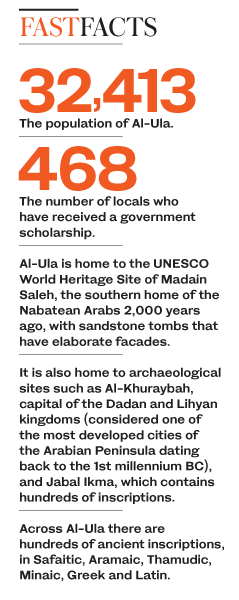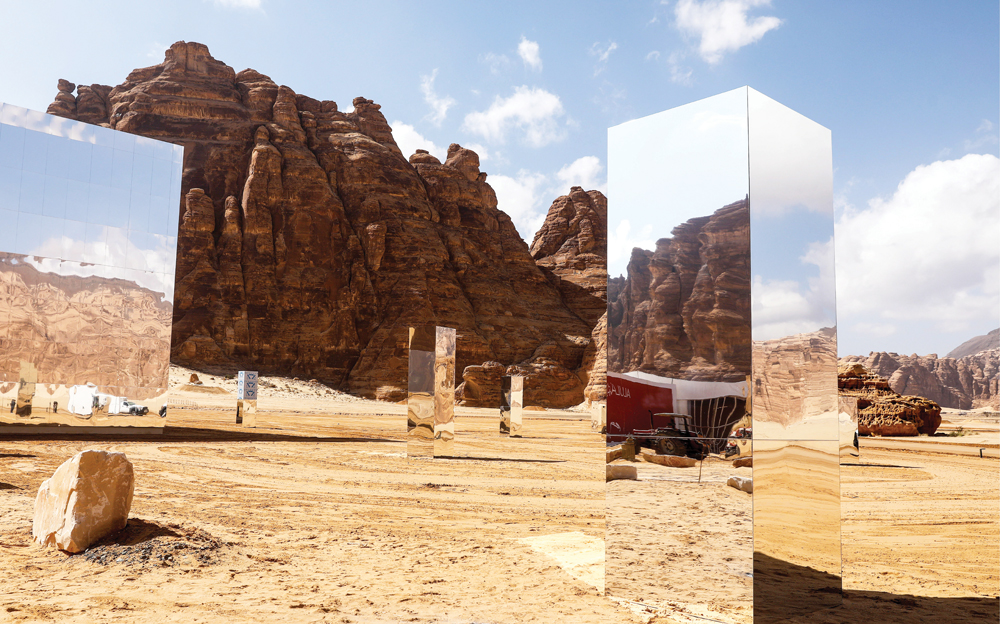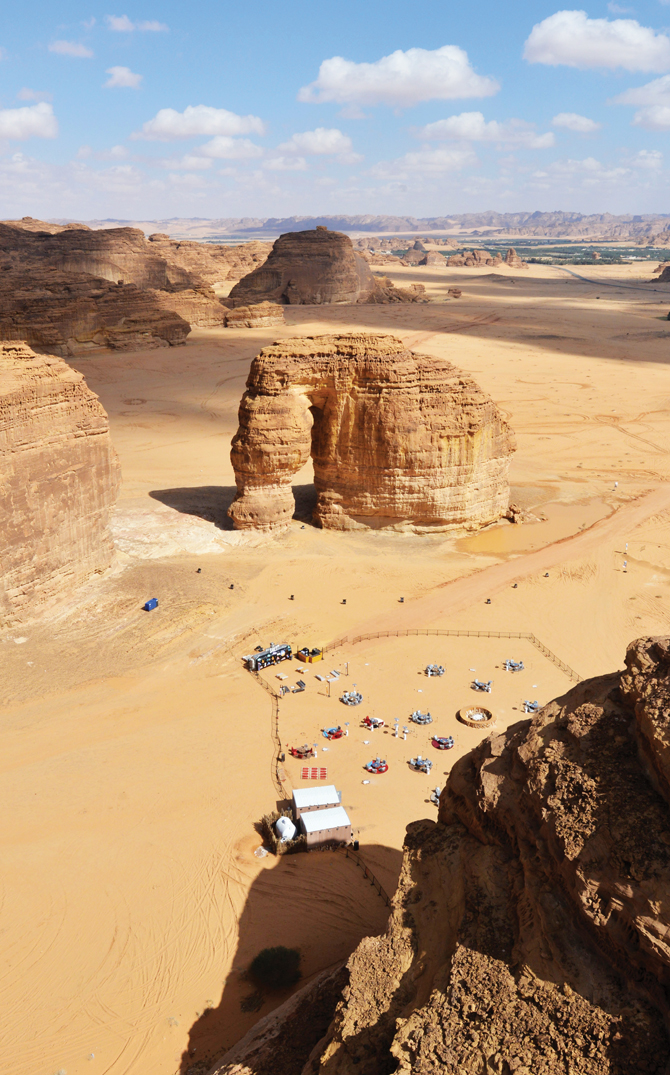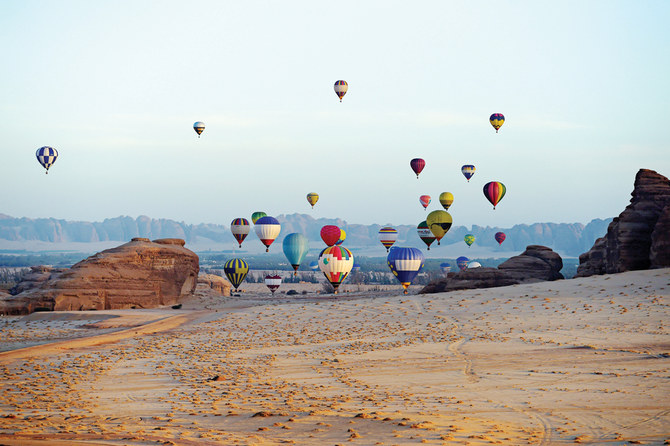RIYADH: In almost no time, the city of Al-Ula in northwest Saudi Arabia went from being relatively unknown to a very early symbol of success for the Kingdom’s ambitious Vision 2030 reform plan.
Previously underdeveloped and mostly ignored, it has now become home to the Winter at Tantora music festival, which was sold out every night between December and February as visitors flocked to see legends such as Andrea Bocelli, Yanni, Mohammed Abdo and Majida El-Roumi perform.
Projects such as the Sharaan Resort and Sharaan Nature Reserve, which are due to open in 2023, promise to turn the city into the tourist hotspot it was always meant to be.
After all, not many places in the world can say they are sitting on 3,000 years of history, which is the case with Al-Ula, which is home to the UNESCO World Heritage Site of Madain Saleh.
Recently, the Hot Air Balloon Festival presented a blueprint for adventure tourism in Saudi Arabia. Next, the Dakar Rally will take place there in 2020.
Al-Ula’s success — mostly due to the work done by a dedicated, recently formed royal commission — portrays what Vision 2030 is all about: Opening up new industries, lessening the Kingdom’s dependence on oil, capitalizing on its long-ignored historic and cultural treasures, and creating jobs for the country’s booming population.
A senior official with access to employment figures told Arab News that in less than three years, Al-Ula has achieved a negative unemployment rate of 2 percent.
This means that Al-Ula now needs to import workers from neighboring regions to keep pace with the demand for jobs.
“I’m so happy with the opening of tourism in Al-Ula. It has given us an opportunity to work and let go of some of the super-conservative beliefs that (our) people had,” said Manal Al-Budair, an Al-Ula local who works in the media.
“In the past, the only acceptable job for females was a teacher. But with the opening up of Al-Ula, much change has taken place,” she added.
“I hope we host more events. It’s truly a pleasure and an honor to welcome people from all over the world to our historical city,” she said.
“Tantora highlighted our youth’s ambitions and our willingness to work hard, prosper and succeed.”

Mirrors outside the Maraya concert hall. (Itar-Tass)
Fired by ambition, many locals say they want to work as managers or hold equivalent job titles.
The perception of some of Al-Ula’s residents is that some senior-level positions have been filled by talent from bigger cities who have more experience in fields such as hotel management and marketing.
However, the Royal Commission for Al-Ula (RCU) has a promising plan to develop skills and deepen the job market.
“The people of Al-Ula are at the heart of the Royal Commission for Al-Ula’s drive to encourage economic prosperity for current and future generations,” said the RCU’s CEO Amr Al-Madani.
“The people of Al-Ula hosted 37,000 visitors from 72 countries around the world during the first successful annual Winter at Tantora festival.”
Ahmed Alimam, a senior tourism development officer at the RCU, told Arab News: “The people of Al-Ula are hugely encouraged by the opportunities continually opening up through Al-Ula’s positioning on the (economic) map.”
He said: “Al-Ula has long been a destination that has welcomed visitors from around the world in its capacity as a historic crossroads and as a place for pilgrims to rest during their journeys.”

The Elephant rock in the Ula desert. (AFP)
He added: “Our ancestors had long guided visitors across the desert, but with the advent of modern-day transport, this role had almost disappeared. Now, we’re sharing our heritage with the world once again.”
The RCU has worked up palpable enthusiasm in Al-Ula over its potential as an outstanding destination for tourists.
Scholarships and training are broadening horizons, meaning that people in Al-Ula are learning from global best practices.
“An entrepreneurial spirit is truly encouraged, with young men and women applying for business licenses and investing in equipment, and even farmers building residential units and huts inside farms and between palm trees,” Alimam said.
The RCU has hired young Saudis from Al-Ula to be trained to become park rangers.

A Saudi park ranger. (Royal Commission for Al-Ula)
They will work to preserve and develop the wildlife in the park, which will have breeding programs for rare and endangered species that are native to the region.
“The rangers have been trained by expert rangers from the College of African Wildlife Management Tanzania (CAWM) from Mweka, which is the leading institution for professional and technical training in wildlife and tourism management in Africa,” said Al-Madani.
“Additionally, qualified and highly experienced staff are offering research and consultancy services to enhance wildlife management at Sharaan, and are now sharing their knowledge with young people in Al-Ula.”
Scholarships are a strong incentive for the people of Al-Ula to be ambitious about their career plans.
The first scholarship phase, which started in 2018, saw a total of 168 students head for studies in the UK, the US and France.
“Following a hugely successful first year, the program is being expanded. In its second year, we’re sending 300 students overseas to the existing three countries as well as Australia,” said Dr. Rami Al-Sakran, director of the RCU’s scholarship program.
“The RCU launched its scholarship program in 2018, with the objective of giving successful applicants the opportunity to pursue degrees at prestigious universities and academic institutions overseas,” he added.
“This is a key pillar in the RCU’s commitment to working with the local community to build their capabilities and empower the region’s development,” he said.
“Recently, we hosted the first midyear summit for our phase 1 students, in the US, the UK and France. We were enormously proud to see the progress they’ve made so far as they get a world-class education and actively engage in new cultures, broadening their horizons.”
Many locals, including Rawan Abdul-Rahman, an organizer of Winter at Tantora, are happy with the opportunities that have been presented to them.
“It was an amazing experience. It gave us opportunities and opened doors for us,” she said.
“Even our families, who are conservative and would’ve never approved of anything like this before, were ecstatic and encouraged us to take part in all the events. This is something unprecedented given our conservative backgrounds.”
Summing up the experience of the local population, Abdul-Rahman added: “Al-Ula not only opened us to the world, it also opened the world to us.”



























